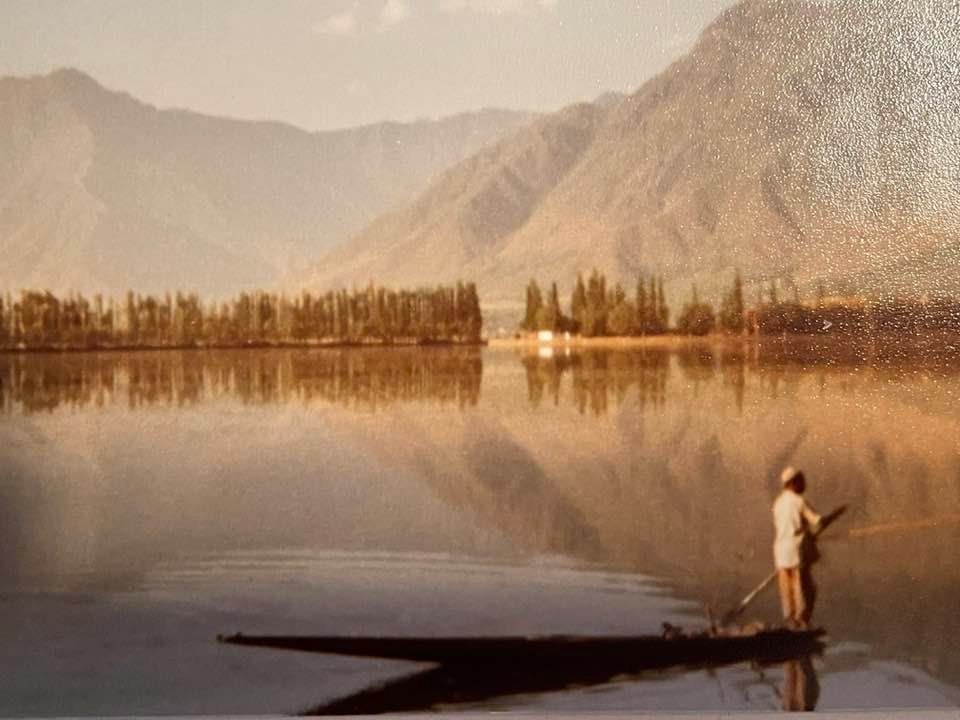FEBRUARY 23, 2022 – Blogger’s Note: I dedicate this series to close friends and fellow world travelers (Including India!), Jack Hoeschler and Linda Lovas Hoescholer. Jack is currently experiencing a rough patch in his own Tropic of Cancer. With his unfailing sense of humor, he called me first thing this morning to report on his current in-patient status as the experts pull him out of a ditch and get him back on the path of recovery. Both of these extraordinary people, each a tour de force in perpetuo in rendering the world a better place, would appreciate from my readers, positive vibes . . . and prayers to the All Powerful Force that binds all of humanity. May Jack’s recovery mirror the happy ending of the subject of this series.
* * *
To escape the “shikara men,” John and I, with Manzoor as guide, hired a shikara owner to take us on an all-day expedition along the 10-mile shoreline of Dal Lake—past the massive “floating gardens” (crops grown on buoyant masses of vegetation) and to the Mughal Gardens on the east side of the lake. We also visited some outlying shops, where I haggled for a kufi (Muslim skull cap) and long silk shirt. (It was time to observe a local version of the traveler’s Roman imperative, “When in Kashmir, dress like a Kashmiri.”)
Toward the end of the trip, we passed a dwelling described most charitably as a hovel. As we floated by, we saw a young teenage girl seated alone by a cooking fire, writhing in pain as she rested the wrist of her righthand in the palm of left hand. We could see that the flesh had been burned off her righthand fingers.
John agreed—we had an obligation to lend assistance. Providing auxiliary paddle-power, we hastened the pace to our houseboat. We pulled what we could from our “travel first aid kits”—packaged, alcohol soaked towelettes, and . . . my iodine solution (See 2/15 post). We then ordered the shikara owner to ferry us back to the site of the accident.
* * *
I remember details of the experience as if it’d unfolded last week, but I was transported to a front-row seat by the contemporaneous report I sent to my family:
Employing Manzoor as interpreter, I told the girl we’d come to help. The injury was the worst I’d had ever seen, but oddly enough, my customary squeamishness quickly disappeared. The girl’s poverty was accompanied by horribly unsanitary living conditions, and it was all too clear that gangrene, amputation, or even loss of life were very real and near possibilities. The first step, then, was to cleanse the septic wound. Using my stock of “Wash ‘n Dry” towelettes. I scrubbed the girl’s dirty flesh surrounding the burns. Next, I called for a clean pot of water, which I sterilized with a heavy dose of iodine.
I told Manzoor to tell her that first, she was really very brave, and second, the more pain she felt, the better off she’d be [a bit of upside-down psychology on my part]. With that, I dipped the girl’s hand into the iodine solution and waited for her screams. None came. She only whimpered and shed a few tears.
By this time a crowd of curious onlookers had gathered, all poor, all filthy dirty, and all keenly interested in these two foreign men. It took little medical knowledge to realize that the suffering girl would require more professional help.
“When did this happen?” I asked.
“Five days ago,’” came the answer. My heart flipped. I thought I’d been administering first aid, ‘first’ meaning immediate.
“Why hasn’t she been to a doctor?” I snapped.
“Her family is too poor,” said Manzoor.
“How much does a damned doctor cost?” I asked.
“Fifteen rupees.” (Cont.)
(Remember to subscribe to this blog and receive notifications of new posts by email.)
© 2022 by Eric Nilsson
